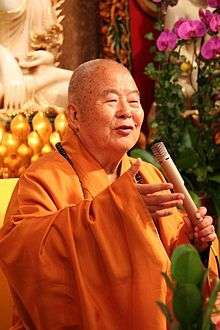Hsing Yun
| Hsing Yun 星雲 | |
|---|---|
 Hsing Yun in 2009 | |
| School | Fo Guang Shan |
| Personal | |
| Nationality | Han Chinese |
| Born |
19 August 1927[1] Jiangsu, China |
| Senior posting | |
| Successor | Hsin Ping |
| Religious career | |
| Present post | Spiritual advisor of Fo Guang Shan |
Hsing Yun (Chinese: 星雲大師; pinyin: Xīngyún Dàshī; Pe̍h-ōe-jī: Seng-hûn tāi su; born 19 August 1927) is a Chinese Buddhist monk and the founder of the Fo Guang Shan new religious movement as well as the affiliated Buddha's Light International Association. He was abbot of the order until his resignation in 1985.[2]
Hsing Yun is a proponent of "humanistic" Buddhism, as taught by the Fo Guang Shan order.[3]
In Taiwan, Hsing Yun is notable for his activity in political affairs, particularly as a supporter of the One-China policy as well as government legislation supported by the Kuomintang, and has been criticized for his views by those in favor of Taiwan independence and by religious figures, as being overtly political and "considerably far afield from traditional monastic concerns".[1][4] During the 2008 presidential election, Hsing Yun publicly endorsed Kuomintang candidate Ma Ying-jeou.[5] During the second World Buddhist Forum in 2009, Hsing Yun asserted that there are "no Taiwanese" and that Taiwanese "are Chinese".[4] In 2012 he said that the Senkaku Islands (also known as the Diaoyutai Islands) belonged to China.[6] He has encouraged reconciliation between China and the Dalai Lama,[7] though he has distanced himself from the Dalai Lama in the past for fears of causing rifts between him and his organisation and the Chinese government.[8]
Health
On 26 December 2011, Hsing Yun suffered a minor ischemic stroke, his second in that year.[9]
References
- 1 2 [s.n.] (4 June 2008). A Buddhist master straddles the Taiwan Straits: Hsing Yun seeks to make reunification Buddhism’s sixth precept – at least for Beijing. Asia Sentinel. Archived 15 September 2015.
- ↑ Fo Guang Shan – Abbotship. Archived 26 August 2006.
- ↑ Richard L. Kimball (2000). Humanistic Buddhism as Conceived and Interpreted by Grand Master Hsing Yun of Fo Guang Shan. Hsi Lai Journal of Humanistic Buddhism 1: 1–52.
- 1 2 Loa Iok-sin (31 March 2009). Taiwan Buddhist master: 'No Taiwanese'. Taipei Times. Archived 2 April 2009.
- ↑ "意在言外 星雲籲幫馬找工作". 民視新聞. 26 December 2011.
- ↑ "Master Hsing Yun says China owns Diaoyutais". Taipei Times. 18 September 2012.
- ↑ "Taiwan monk urges China to befriend Dalai Lama".
- ↑ Chandler, Stuart (2004). Establishing a Pure Land on Earth: The Foguang Buddhist Perspective on Modernization and Globalization. Topics in Contemporary Buddhism. University of Hawaii Press. pp. 258–259.
- ↑ Taipei Times: Hsing Yun recovering after stroke, 26 December 2011
Bibliography
- Chia, Jack Meng-Tat (2015). Toward a Modern Buddhist Hagiography Telling the Life of Hsing Yun in Popular Media, Asian Ethnology 74 (1), 141–165
External links
-
 Media related to Hsing Yun at Wikimedia Commons
Media related to Hsing Yun at Wikimedia Commons -
 Quotations related to Hsing Yun at Wikiquote
Quotations related to Hsing Yun at Wikiquote - The Works of Hsing Yun
- Venerable Master Hsing Yun
| Buddhist titles | ||
|---|---|---|
| Preceded by None |
Abbot and Director of Fo Guang Shan 1967–1985 |
Succeeded by Hsin Ping |
| Preceded by New creation |
Honorary President of the World Fellowship of Buddhists Served alongside: K. Sri Dhammananda 1993 |
Succeeded by incumbent |